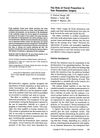 165 citations,
December 2002 in “Molecular and Cellular Endocrinology”
165 citations,
December 2002 in “Molecular and Cellular Endocrinology” Male hormones, particularly DHT, are linked to male pattern hair loss, and treatments like finasteride can help, but they don't work for postmenopausal women's hair loss, which may have different causes.
 October 2023 in “Research Square (Research Square)”
October 2023 in “Research Square (Research Square)” Polynucleotide gel injections help reduce hair loss and increase hair thickness in people with pattern hair loss, with few side effects.
29 citations,
February 2011 in “PloS one” Astressin-B can reverse and prevent hair loss in stressed mice.
 9 citations,
January 1992 in “Journal of Investigative Dermatology”
9 citations,
January 1992 in “Journal of Investigative Dermatology” Sugar molecule helps hair growth, less in balding, returns with treatment.
 13 citations,
February 2020 in “Clinical, Cosmetic and Investigational Dermatology”
13 citations,
February 2020 in “Clinical, Cosmetic and Investigational Dermatology” Men with hair loss have higher BMI, waist size, blood pressure, and are linked to smoking and inactivity.
 May 2015 in “Journal of The American Academy of Dermatology”
May 2015 in “Journal of The American Academy of Dermatology” There's a growing resistance to the antibiotic mupirocin in children's skin infections caused by MRSA in New York.
 February 2024 in “International Journal of Molecular Sciences”
February 2024 in “International Journal of Molecular Sciences” Hair loss in Androgenetic Alopecia is caused by genetics, aging, and lifestyle, leading to hair follicle shrinkage and related health risks.
 74 citations,
January 1998 in “Dermatology”
74 citations,
January 1998 in “Dermatology” Men who think they are losing hair feel worse about themselves, especially if they are younger.
 December 2023 in “Journal of Cosmetic Dermatology”
December 2023 in “Journal of Cosmetic Dermatology” The hair growth product was effective and safe, increasing hair growth, thickness, and density while reducing hair fall.
 April 2024 in “Journal of translational medicine”
April 2024 in “Journal of translational medicine” MJ04, a new compound, effectively promotes hair growth and is a potential topical treatment for hair loss.
 35 citations,
January 2000 in “Dermatology”
35 citations,
January 2000 in “Dermatology” Hair loss common in Norwegian men, affecting self-esteem and life quality.
 129 citations,
October 2000 in “British Journal of Dermatology”
129 citations,
October 2000 in “British Journal of Dermatology” Finasteride helps increase hair growth in men with hair loss.
 1 citations,
January 2017 in “SAGE Open Medical Case Reports”
1 citations,
January 2017 in “SAGE Open Medical Case Reports” A woman's hair loss condition got worse after her varicose vein treatment with a specific foam.
 3 citations,
February 1997 in “Annals of Plastic Surgery”
3 citations,
February 1997 in “Annals of Plastic Surgery” The document concludes that successful hair restoration surgery should consider facial proportions and balance, and requires surgical skill, artistic judgment, and realistic goals for a natural look.
 November 2023 in “International Journal of Cosmetic Science”
November 2023 in “International Journal of Cosmetic Science” Wheat polar lipid complex reduces hair loss and improves hair growth in women.
 24 citations,
January 1993 in “Dermatologic Clinics”
24 citations,
January 1993 in “Dermatologic Clinics” Minoxidil effectively treats hair loss, works better for women, and requires consistent use.
 4 citations,
August 2013 in “Expert Review of Dermatology”
4 citations,
August 2013 in “Expert Review of Dermatology” Updated treatments for female hair loss include minoxidil, antiandrogens, hair transplants, and light therapy.
 87 citations,
October 1997 in “JAMA”
87 citations,
October 1997 in “JAMA” Some vaccines might rarely cause hair loss, more research is needed.
 124 citations,
July 2012 in “Archives of Dermatological Research”
124 citations,
July 2012 in “Archives of Dermatological Research” Targeting androgen receptors could be a promising way to treat skin disorders with fewer side effects.
 3 citations,
June 2004 in “Alternative and Complementary Therapies”
3 citations,
June 2004 in “Alternative and Complementary Therapies” The document concludes that hair loss is influenced by genetics and other factors, and while treatments like finasteride can help, they have limitations and side effects.
 129 citations,
October 2007 in “The New England Journal of Medicine”
129 citations,
October 2007 in “The New England Journal of Medicine” Over one-third of women experience hair loss, with female-pattern hair loss being most common, and treatments include minoxidil and possibly hair transplantation.
 September 2023 in “IP Journal of Nutrition, Metabolism and Health Science/IP Journal of Nutrition Metabolism and Health Science”
September 2023 in “IP Journal of Nutrition, Metabolism and Health Science/IP Journal of Nutrition Metabolism and Health Science” Recognizing and managing hirsutism, alopecia, and acne is crucial for improving wellbeing in women with PCOS.
 180 citations,
September 1999 in “British Journal of Dermatology”
180 citations,
September 1999 in “British Journal of Dermatology” Hair loss affects self-esteem and quality of life; treatments can help.
 September 2022 in “JAAD Case Reports”
September 2022 in “JAAD Case Reports” COVID-19 may worsen hair loss in people with a certain type of scarring alopecia, but early treatment can help improve symptoms and hair regrowth.
 52 citations,
May 2013 in “Supportive Care in Cancer”
52 citations,
May 2013 in “Supportive Care in Cancer” Scalp cooling significantly reduces hair loss in chemotherapy patients.
 April 2024 in “Medical & clinical research”
April 2024 in “Medical & clinical research” More research is needed to find the best long-term treatments for Alopecia Areata.
 16 citations,
May 2015 in “Tissue Engineering Part C-methods”
16 citations,
May 2015 in “Tissue Engineering Part C-methods” A two-step method was created in 2015 to make more cells that help with hair growth, but they need to be combined with other cells for 4 days to actually form new hair.
 January 2014 in “Journal of Pigmentary Disorders”
January 2014 in “Journal of Pigmentary Disorders” Women's hair gets thinner and grayer as they age, with treatments available for hair loss and graying.
 17 citations,
October 2015 in “Medicine and Pharmacy Reports”
17 citations,
October 2015 in “Medicine and Pharmacy Reports” Animal models are crucial for learning about hair loss and finding treatments.
9 citations,
January 2013 in “International journal of trichology” 88% phenol is effective for treating alopecia areata.




























